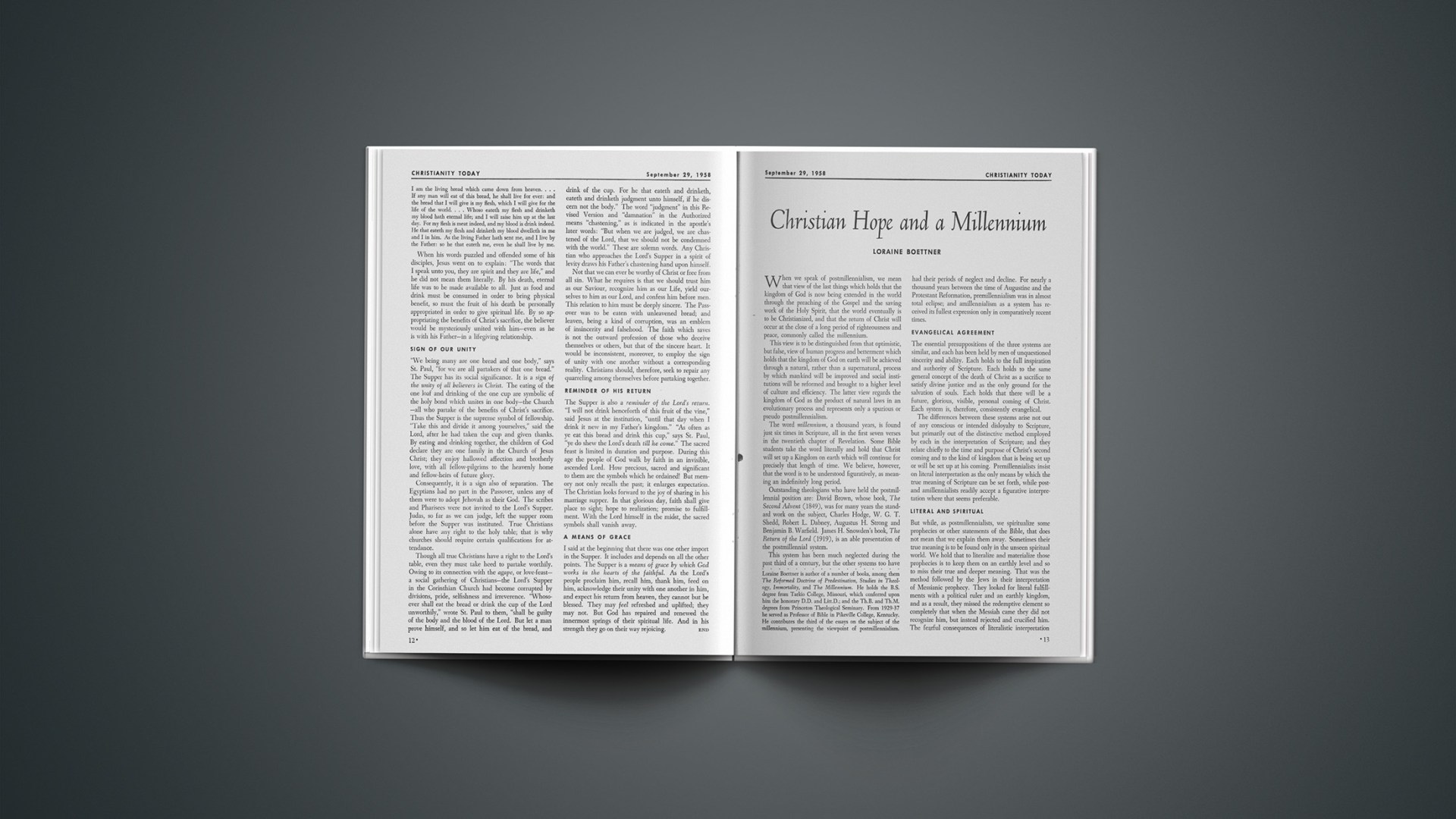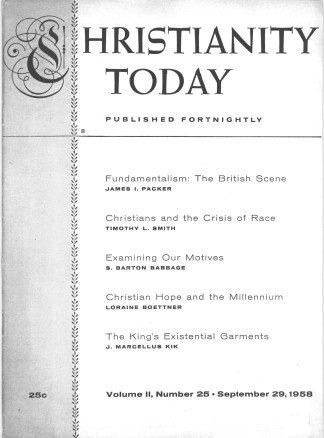When we speak of postmillennialism, we mean that view of the last things which holds that the kingdom of God is now being extended in the world through the preaching of the Gospel and the saving work of the Holy Spirit, that the world eventually is to be Christianized, and that the return of Christ will occur at the close of a long period of righteousness and peace, commonly called the millennium.
This view is to be distinguished from that optimistic, but false, view of human progress and betterment which holds that the kingdom of God on earth will be achieved through a natural, rather than a supernatural, process by which mankind will be improved and social institutions will be reformed and brought to a higher level of culture and efficiency. The latter view regards the kingdom of God as the product of natural laws in an evolutionary process and represents only a spurious or pseudo postmillennialism.
The word millennium, a thousand years, is found just six times in Scripture, all in the first seven verses in the twentieth chapter of Revelation. Some Bible students take the word literally and hold that Christ will set up a Kingdom on earth which will continue for precisely that length of time. We believe, however, that the word is to be understood figuratively, as meaning an indefinitely long period.
Outstanding theologians who have held the postmillennial position are: David Brown, whose book, The Second Advent (1849), was for many years the standard work on the subject, Charles Hodge, W. G. T. Shedd, Robert L. Dabney, Augustus H. Strong and Benjamin B. Warfield. James H. Snowden’s book, The Return of the Lord (1919), is an able presentation of the postmillennial system.
This system has been much neglected during the past third of a century, but the other systems too have had their periods of neglect and decline. For nearly a thousand years between the time of Augustine and the Protestant Reformation, premillennialism was in almost total eclipse; and amillennialism as a system has received its fullest expression only in comparatively recent times.
Evangelical Agreement
The essential presuppositions of the three systems are similar, and each has been held by men of unquestioned sincerity and ability. Each holds to the full inspiration and authority of Scripture. Each holds to the same general concept of the death of Christ as a sacrifice to satisfy divine justice and as the only ground for the salvation of souls. Each holds that there will be a future, glorious, visible, personal coming of Christ. Each system is, therefore, consistently evangelical.
The differences between these systems arise not out of any conscious or intended disloyalty to Scripture, but primarily out of the distinctive method employed by each in the interpretation of Scripture; and they relate chiefly to the time and purpose of Christ’s second coming and to the kind of kingdom that is being set up or will be set up at his coming. Premillennialists insist on literal interpretation as the only means by which the true meaning of Scripture can be set forth, while post- and amillennialists readily accept a figurative interpretation where that seems preferable.
Literal And Spiritual
But while, as postmillennialists, we spiritualize some prophecies or other statements of the Bible, that does not mean that we explain them away. Sometimes their true meaning is to be found only in the unseen spiritual world. We hold that to literalize and materialize those prophecies is to keep them on an earthly level and so to miss their true and deeper meaning. That was the method followed by the Jews in their interpretation of Messianic prophecy. They looked for literal fulfillments with a political ruler and an earthly kingdom, and as a result, they missed the redemptive element so completely that when the Messiah came they did not recognize him, but instead rejected and crucified him. The fearful consequences of literalistic interpretation as it related to the first coming should put us on guard against making the same mistake for the second.
The millennium to which the postmillennialist looks forward is a golden age of spiritual prosperity embraced in the larger Church age. We hold that the present age gradually merges into the millennial age as an increasingly larger proportion of the world’s inhabitants are converted to Christianity. We do not hold that every person will be a Christian, nor that sin will be completely eliminated, but only that sin will be reduced to a minimum. Sinless perfection belongs only to the heavenly state. The earth during the present age can never become paradise regained. But a Christianized world can afford a foretaste of heaven, an earnest of the good things that God has in store for those who love him.
World Will Get Better
As the millennium becomes a reality, Christian principles of belief and conduct will be the accepted standard for nations and individuals. Figuratively, the wolf and the lamb shall dwell together when people and forces formerly antagonistic and hateful to each other are so changed that they work together in one harmonious purpose. The desert shall blossom as the rose, literally, as economic and scientific advances lead to generally prosperous conditions the world over; and figuratively, as moral and spiritual conditions are improved. Health and education will be the rule, and wealth will be vastly more abundant and more widely shared.
Life at that time will compare with life in the world today in much the same way that life in a truly Christian community compared with that in a pagan or irreligious community. The millennium embodies, therefore, not a political world power kingdom of Jewish supremacy continuing for an exact one thousand years, but a spiritual kingdom in the hearts of men, of which the Church will continue to be then as now the outward and visible manifestation. It closes with the second coming of Christ, the general resurrection and judgment.
What The Scripture Says
But the important question is, What do the Scriptures say about a future golden age? Do they warrant such an expectation? In both the Old and New Testaments we find an abundance of evidence to that effect, although lack of space prevents us from giving more than a small portion of that evidence. Isaiah tells us that “the earth shall be full of the knowledge of Jehovah, as the waters cover the sea” (11:9). Jeremiah gives the promise that the time is coming when it no longer will be necessary for a man to teach his neighbor or his brother, saying, “Know the Lord: for they shall all know me, from the least of them unto the greatest of them” (31:34).
Speaking through the psalmist, God says, “Ask of me, and I shall give thee the heathen for thine inheritance, and the uttermost parts of the earth for thy possession” (2:8); and again, “All the ends of the world shall remember and turn unto the Lord: and all the kindreds of the nations shall worship before thee” (22:27). The last book of the Old Testament contains a promise that “from the rising of the sun even unto the going down of the same my name shall be great among the Gentiles” (Mal. 1:11). These great and precious promises are so far reaching and expansive that they stagger the imagination.
In the New Testament we find the same clear teaching. Strong emphasis is placed on the fact that it is the world that is the object of Christ’s redemption. “God was in Christ reconciling the world unto himself” (2 Cor. 5:19). “For God sent not the Son into the world to condemn the world; but that the world through him might be saved” (John 3:17). The parable of the leaven teaches the universal extension and triumph of the Gospel as society is transformed by the Kingdom influences.
Victory Certain
The redemption of the world, then, is a long, slow process, extending through the centuries, yet surely approaching an appointed goal. We live in the day of advancing victory and see the conquest taking place. From the human viewpoint there are many apparent setbacks, and it often looks as though the forces of evil are about to gain the upper hand. But as one age succeeds another, there is progress. Looking back across the nearly 2,000 years that have elapsed since the coming of Christ, we see that there has been marvelous progress. All over the world, pagan religions have had their day and are disintegrating. None of them can stand the open competition of Christianity. They await only the coup de grace of an aroused and energetic Christianity to send them into oblivion.
We have been commanded by our Lord to go and make disciples of all the nations. We are engaged in a mighty struggle that rages through the centuries; there can be no compromise. The Church must conquer the world, or the world will destroy the Church. Christianity is the system of truth, the only one that through the ages has had the blessing of God upon it. We shall not expect the final fruition within our lifetime, nor within this century. But the goal is certain and the outcome is sure. The future is as bright as the promises of God. The great requirement is faith that the Great Commission of Christ will be fulfilled through the outpouring of the Holy Spirit and preaching of the everlasting Gospel.
Loraine Boettner is author of a number of books, among them The Reformed Doctrine of Predestination, Studies in Theology, Immortality, and The Millennium. He holds the B.S. degree from Tarkio College, Missouri, which conferred upon him the honorary D.D. and Litt.D.; and the Th.B. and Th.M. degrees from Princeton Theological Seminary. From 1929–37 he served as Professor of Bible in Pikeville College, Kentucky. He contributes the third of the essays on the subject of the millennium, presenting the viewpoint of postmillennialism.










